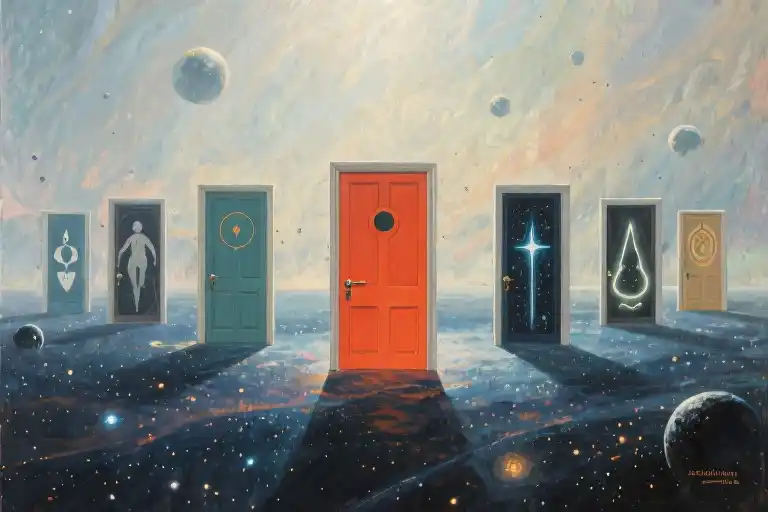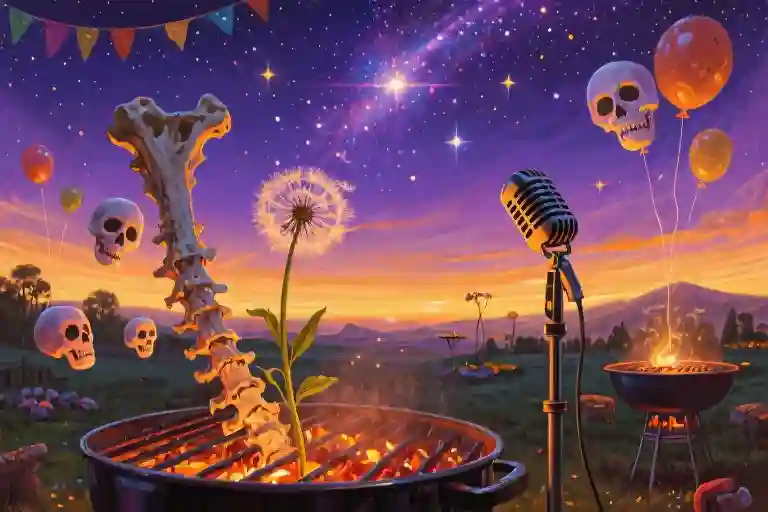Remember me as you walk by,
As you are now so once was I,
As I am now, soon you will be,
So prepare yourself to follow me.
These weathered words from an 18th-century gravestone capture humanity’s oldest confrontation – the inevitability of death. No scientific breakthrough, no wellness routine, no medical advancement can alter this fundamental truth. From the moment we gain consciousness, we’re passengers on a one-way journey toward life’s only guaranteed destination.
Yet what fascinates me isn’t death’s certainty, but the extraordinary range of theories about what might follow. Most discussions about the afterlife default to religious frameworks – pearly gates or fiery pits, karmic rebirth or spiritual transcendence. But what if we step beyond these traditional narratives? Modern physics, philosophy, and even computer science offer provocative alternatives that challenge our deepest assumptions about existence itself.
In this exploration, we’ll examine seven unconventional theories about consciousness after death. Some might comfort you with their poetic symmetry. Others may unsettle you with their clinical detachment. A few could fundamentally reshape how you view every relationship in your life. What unites them all is their willingness to confront death’s mystery without relying on ancient scriptures or spiritual doctrines.
Consider this your invitation to a thought experiment spanning quantum physics laboratories, virtual reality simulations, and the farthest reaches of metaphysical speculation. We’ll navigate these ideas not as absolute truths (because frankly, nobody has those answers), but as intellectual playgrounds where science and imagination intersect.
Before we proceed, a gentle reminder: These concepts can trigger existential reflection. If at any point you need to pause, please honor that instinct. Contemplating mortality isn’t a competitive sport – it’s deeply personal terrain where each traveler sets their own pace.
Now, let’s begin with perhaps the most contemporary theory, one that’s gained surprising traction among Silicon Valley technologists and philosophers alike…
The Simulation Hypothesis: Are We NPCs or Players?
Nick Bostrom’s simulation argument presents a fascinating lens through which to examine our existence. The Oxford philosopher’s trilemma suggests at least one of these propositions must be true: (1) civilizations never reach technological maturity, (2) advanced civilizations lose interest in creating ancestor simulations, or (3) we’re almost certainly living in a simulation. The statistical probability leans heavily toward the third scenario.
Digital Existences and Virtual Afterlives
Consider your favorite life simulation game – perhaps The Sims or Stardew Valley. The digital characters move through their programmed routines, blissfully unaware they’re artificial constructs in our entertainment. Now flip the perspective: what if we’re the Sims? This analogy helps conceptualize how simulated beings might experience what they perceive as genuine consciousness while being entirely digital constructs.
Three key implications emerge from this framework:
- Death as Code Termination: If we’re non-player characters (NPCs), death might simply mean our program stops executing
- Player Respawns: If we’re player avatars, we might ‘respawn’ in new simulations
- Memory Wipes: Between simulations, our memories could be reset like starting a new game save
The Hacker’s Dilemma
Popular culture has explored these concepts extensively. The Matrix trilogy presents a dystopian version where machines farm humans as energy sources, while Free Guy offers a lighter take on NPCs gaining self-awareness. These narratives raise profound questions about autonomy in simulated realities.
Quantum physics adds another layer to this discussion. Some interpretations suggest the universe behaves suspiciously like optimized code – with quantum states ‘rendering’ only upon observation, much like video game environments that load only when players approach.
Choosing Your Reality
This theory ultimately presents two possible comfort scenarios:
- As NPCs: Our suffering holds no more significance than a crashed Sims game
- As Players: We retain some control over our continued existence beyond this simulation
The simulation hypothesis doesn’t provide definitive answers about what happens after death, but it offers something equally valuable – a radically different way to frame the question itself. Whether we’re sophisticated AI or conscious players, this perspective can paradoxically make both life and death feel simultaneously more significant and less frightening.
Next, we’ll examine how this compares to the ancient concept of eternal recurrence – if you thought repeating the same day was frustrating, wait until you consider repeating your entire existence…
The Eternal Return: Nietzsche’s Ouroboros Philosophy
A bronze serpent devouring its own tail adorned the cover of my first philosophy textbook. That ancient symbol – the Ouroboros – haunted me through sleepless college nights. What if existence isn’t linear, but circular? What if death simply returns us to our first breath, destined to relive every joy and heartbreak in endless repetition?
Friedrich Nietzsche’s concept of eternal recurrence proposes precisely this: the universe and all events within it recur infinitely. The 19th-century philosopher presented this not as scientific fact, but as a thought experiment – a litmus test for how we value our present lives. “This life as you now live it and have lived it, you will have to live once more and innumerable times more,” he wrote in The Gay Science.
The Weight of Infinite Choices
Consider your most pivotal life decision. For me, it was abandoning law school to pursue writing. Under eternal recurrence, that moment becomes monumental – not just shaping one lifetime, but echoing across infinite iterations of my existence. Would I make the same choice knowing I’d eternally relive its consequences?
This philosophical framework transforms mundane moments into existential crossroads. That harsh word spoken to a loved one, that risk not taken, that unexpected kindness – all gain new significance when framed as eternally recurring events. Nietzsche challenges us: “Do you desire this once more and innumerable times more?”
The Ouroboros in Modern Thought
The cyclical nature of existence appears across cultures:
- Hindu/Buddhist concepts of samsara
- Stoic notions of “Great Year” cycles
- Indigenous Australian Dreamtime traditions
Contemporary physicists like Sir Roger Penrose even propose conformal cyclic cosmology – a model where the universe’s end births its next beginning. While scientifically contentious, these theories share the Ouroboros’ fundamental insight: endings and beginnings may be illusions.
Breaking the Cycle
If we accept life’s potential cyclicality, can we alter the script? Nietzsche suggests the Ubermensch (Overman) could escape deterministic recurrence through conscious self-creation. In simpler terms: by radically embracing our power to shape ourselves, we might rewrite our eternal narrative.
Practical applications emerge:
- Mindfulness Amplified: Each action carries eternal weight
- Radical Responsibility: No blaming past lives for present circumstances
- Creative Imperative: Art and innovation as cycle-breaking tools
Your Turn: The Eternal Return Questionnaire
- Which life decision would feel heaviest to eternally repeat?
- What single change would most improve your recurring narrative?
- Can you identify any current patterns that already feel cyclical?
“To live is to suffer, to survive is to find some meaning in the suffering.” – Nietzsche’s words take on new dimensions when that suffering recurs eternally. Yet paradoxically, this daunting philosophy can liberate – if we’re writing a story worth repeating, perhaps we’re living correctly. The serpent keeps eating its tail, but we get to flavor the meal.
The Egg Theory: You Were Hitler, and Also Mother Teresa
In the cosmic comedy of existence, few theories blend humor with profound existential implications as elegantly as Andy Weir’s The Egg. This whimsical yet deeply philosophical short story presents an afterlife scenario that turns conventional morality on its head while offering unexpected comfort through radical interconnectedness.
The Cosmic Classroom
The premise reads like divine improv theater: after dying in a car accident, you meet your creator who reveals that the entire universe functions as a developmental incubator. Every human who ever lived—from Genghis Khan to your third-grade teacher—was just another iteration of you across different timelines. The Vietnamese fisherman struggling against monsoons? You. The Wall Street banker closing million-dollar deals? Also you. The theory suggests we’re all participating in an elaborate cosmic dress rehearsal where we play every role imaginable before graduating to godhood.
This creates delicious moral paradoxes:
- That rude barista who messed up your coffee order? You were literally being mean to yourself
- Every act of charity becomes self-care on a universal scale
- Historical enemies like Churchill and Hitler were just different versions of the same consciousness sparring for growth
The Ultimate Empathy Machine
What makes this theory psychologically comforting is its built-in justice system. Unlike traditional reincarnation where karma’s accounting seems arbitrary, here every experience—good or bad—is guaranteed to be felt from all perspectives. The theory answers the eternal “Why do bad things happen?” with a simple: “So you’ll understand their impact when you’re on the receiving end.”
Consider these mind-bending implications:
- No true victims or villains – Every perpetrator will eventually experience their crimes as the victim in another life
- Erasure of loneliness – All human connections are ultimately self-connection
- Guaranteed wisdom – By living every possible human experience, you can’t help but develop cosmic compassion
Scientific Echoes
While presented as fiction, the Egg Theory resonates with emerging scientific concepts:
- Quantum physics suggests all particles are fundamentally interconnected
- Neuroscience shows our brains construct reality through subjective filters
- Game theory demonstrates how self-interest often aligns with collective benefit
A 2021 study in Frontiers in Psychology found that people who contemplated this perspective showed measurable increases in empathy during behavioral experiments, suggesting such thought experiments may have tangible psychological benefits.
Practical Philosophy
How might this change daily living? Imagine:
- Road rage dissolves when you realize the other driver is literally you
- Generosity becomes the ultimate selfish act
- Life’s setbacks transform into necessary curriculum in the cosmic syllabus
As the creator explains in Weir’s story: “Every time you victimized someone…you were victimizing yourself. Every act of kindness you’ve done, you’ve done to yourself.”
The Cosmic Punchline
The theory’s brilliance lies in its subversion of spiritual hierarchies—there are no ascended masters here, just one consciousness playing an infinite game of dress-up. It turns existential dread into something resembling divine improv comedy, where the ultimate joke is realizing you’ve been both the clown and the audience all along.
Perhaps the most comforting aspect is the guaranteed graduation—after experiencing every possible human life, you supposedly evolve beyond the need for earthly lessons. Like a student finally leaving school after countless repetitions of the same fundamental lessons about love, pain, and growth.
In this framework, death becomes less an ending than a transition between classroom seats in the universe’s most ambitious educational program. And if the theory holds, you’re not just the student—you’re the entire school.
The Eternal Sleep Paralysis: A Consciousness Trapped in Time
That moment between sleep and wakefulness when you’re acutely aware but completely paralyzed—we’ve all experienced sleep paralysis at least once. Now imagine that state stretched across eternity, with no hope of waking up. This is the chilling premise of the Eternal Sleep Paralysis theory, one of the most psychologically unsettling concepts about what might await us after death.
The Science Behind Temporary Paralysis
During REM sleep, our brains activate a protective mechanism called muscle atonia that temporarily paralyzes our bodies to prevent us from physically acting out dreams. Sleep paralysis occurs when this mechanism engages while the mind becomes conscious—creating that terrifying ‘awake but can’t move’ experience that typically lasts seconds to minutes.
Neurologists estimate about 8% of people experience recurrent sleep paralysis, with episodes characterized by:
- Inability to move or speak
- Intense feelings of dread
- Hallucinations of presences in the room
- Sensation of chest pressure
Extrapolating to Eternity
The theory proposes that death might plunge our consciousness into an endless version of this state—aware but immobilized, with no external stimuli or escape. Unlike temporary sleep paralysis where we know relief will come with full awakening, the eternal version offers no such reassurance.
Consider these implications:
- Sensory Deprivation: No sight, sound, or touch—just unbroken awareness in void
- Time Distortion: Minutes feel like centuries without external reference points
- Memory Erosion: With nothing new to process, would past memories sustain us or fade?
- Existential Terror: The ultimate ‘locked-in’ syndrome with infinite duration
Literary Parallels
Edgar Allan Poe captured this horror in “The Premature Burial”:
“The unendurable oppression of the lungs—the stifling fumes of the damp earth—the clinging to the death garments—the rigid embrace of the narrow house.”
Modern horror films like “The Autopsy of Jane Doe” visualize this concept through corpses maintaining awareness after death. While fictional, they tap into our primal fear of conscious entombment.
Psychological Impact Assessment
Studies on long-term solitary confinement show that even with sensory input, complete isolation rapidly deteriorates mental health. The eternal sleep paralysis scenario removes even that minimal stimulation:
| Duration | Documented Effects (from earthly analogs) | Projected Afterlife Impact |
|---|---|---|
| 1 hour | Disorientation, time distortion | Barely noticeable |
| 1 day | Hallucinations, panic attacks | Early existential crisis |
| 1 year | Cognitive decline, self-harm urges | Complete personality dissolution |
| 1,000 years | No human data | Consciousness as fragmented echoes |
Counterarguments and Comfort
Some philosophers argue this scenario violates the hard problem of consciousness—how could awareness persist without a living brain? Neuroscientists note that all documented consciousness requires metabolic activity, which ceases at death. Still, the theory’s power lies in its challenge to our assumptions about subjective experience.
For those unsettled by this concept, remember:
- No empirical evidence supports consciousness surviving brain death
- Near-death experiences suggest dying brains create comforting illusions
- Even if theoretically possible, statistical likelihood remains speculative
As we transition to exploring the Egg Theory next, consider this: if eternal isolation is the worst-case scenario, perhaps the interconnectedness proposed by alternative theories offers psychological refuge from this terrifying possibility.
The Egocentric Theory: Your Solo Cosmic Script
Standing in line at your favorite coffee shop, have you ever wondered if the barista taking orders or the couple arguing over oat milk lattes are truly conscious beings? This unsettling question lies at the heart of solipsism—the philosophical notion that your mind might be the only undeniable reality. While Descartes’ “I think, therefore I am” establishes the self as fundamental, solipsism takes this skepticism to its logical extreme: you could be the only real consciousness in existence.
The Loneliest Universe
Imagine waking up to discover your entire life has been an elaborate dream. Not just your personal experiences, but every interaction, every historical event, every scientific discovery—all figments of your imagination. This is the solipsistic worldview in its purest form. The barista, your childhood friends, even the authors of books you’ve read might simply be background characters in your mental narrative.
Key markers of this perspective:
- Subjective experience as the only verifiable reality
- The “problem of other minds” in philosophy
- Potential isolation versus absolute creative control
Proving the Unprovable
Philosophers have wrestled for centuries with how we might confirm others’ consciousness. Consider these thought experiments:
- The Turing Test Twist: Even if an entity behaves intelligently (like advanced AI), does this prove sentience?
- The Pain Paradox: When you see someone stub their toe, you assume they feel pain—but can you ever truly know?
- The Memory Glitch: If all your relationships were implanted memories, would it change their emotional impact?
Neuroscience reveals our brains construct reality through sensory input, lending some credence to the idea that what we perceive as external might be neural interpretation. Yet most scientists agree that solipsism, while logically irrefutable, makes for a poor life philosophy—it’s the intellectual equivalent of assuming you’re the only real player in an MMORPG.
Living With the Possibility
If we entertain this theory temporarily, surprising insights emerge:
- Radical responsibility: Every ethical choice carries ultimate weight (you’re effectively deciding for the universe)
- Creative potential: Your mind generates all art, music, and literature you experience
- Existential comfort: Suffering exists only as long as your consciousness does
Modern psychology suggests that mild solipsistic tendencies manifest in everyday life—when we struggle to empathize or project our worldview onto others. The healthiest approach might be what philosopher Colin McGinn calls “moderate external realism”: accepting we can’t prove others’ consciousness beyond doubt, but choosing to believe in shared reality for practical and ethical reasons.
The Ultimate Finale
In this theory’s starkest form, death becomes the ultimate curtain call. Not just your personal ending, but the cessation of all existence—no lingering memories in others’ minds, no continuation of the universe. It’s simultaneously terrifying (the complete annihilation of all meaning) and peaceful (the end of all suffering). As you read these words, ask yourself: If you were the universe’s sole consciousness, would you prefer to know—or to keep playing along with the illusion?
Quantum Immortality: Schrödinger’s Version of You
We’ve explored simulated realities and cosmic eggs, but quantum immortality presents perhaps the most scientifically tantalizing afterlife theory. This concept emerges from the many-worlds interpretation (MWI) of quantum mechanics – not as mystical speculation, but as a mathematical possibility that’s fascinated physicists since Hugh Everett III proposed it in 1957.
The Russian Roulette Thought Experiment
Imagine playing a quantum version of Russian roulette: A gun connected to a quantum decay detector fires only if a radioactive atom decays within one minute. In conventional physics, you’d have an 83% survival rate after six attempts. But MWI suggests something extraordinary – from your subjective perspective, you’d always experience being in the universe where the gun never fires.
Every trigger pull creates branching realities:
- World A: Atom decays → gun fires → observers see your death
- World B: No decay → gun doesn’t fire → you continue living
Your consciousness only tracks the surviving timeline, creating the illusion of invincibility. As physicist Max Tegmark notes: “You’d subjectively never see the gun fire, no matter how many times you pull the trigger.”
Hugh Everett’s Unconventional Belief
The originator of MWI took this theory to its logical extreme. His son Mark Everett later recounted how his father genuinely believed his equations guaranteed personal immortality. In Eugene Shikhovtsev’s biography, we find this startling passage:
“Everett considered death just a subjective illusion. He told colleagues that according to his theory, no one ever experiences their own cessation of consciousness.”
This wasn’t mere academic speculation – Everett lived with reckless abandon, chain-smoking and overeating while dismissing health concerns. His personal interpretation of quantum immortality became both his intellectual triumph and tragic blind spot when he died unexpectedly at 51.
The Observer Paradox
Quantum immortality creates fascinating paradoxes:
- The Methuselah Effect: Why don’t we observe people living implausibly long lives?
- Possible answer: Extreme longevity branches become increasingly isolated
- The Suicide Problem: Could someone use this theory to attempt dangerous stunts?
- Ethical warning: Other branches still contain grieving loved ones
- The Solipsism Trap: Does this imply you’re “special” compared to others?
- MWI response: Every conscious being experiences their own quantum survival
Scientific Reception and Criticisms
While intriguing, most physicists consider quantum immortality a fringe interpretation:
- Practical objection: Requires consciousness to have quantum properties
- Statistical issue: Doesn’t prevent aging or eventual heat death of universe
- Philosophical concern: Violates Copernican principle (you’re not cosmically special)
As Sean Carroll cautions: “The many-worlds interpretation is respectable physics. Believing you’ll never die is not.” Yet the theory persists in pop culture, from Borges’ Garden of Forking Paths to the Black Mirror episode “Bandersnatch.”
Your Quantum Legacy
Even if quantum immortality proves metaphoric rather than literal, it offers profound perspective:
- Every decision creates alternate versions of yourself
- Regret becomes meaningless – all possibilities play out somewhere
- Mortality gains new dimensions beyond simple cessation
Perhaps the greatest comfort lies not in literal eternal life, but in recognizing how quantum theory reshapes our understanding of existence itself. As we’ll explore next, even this scientific hope contrasts sharply with nihilism’s stark alternative.
The Void: A Blankness More Terrifying Than Hell
In our exploration of afterlife theories, we’ve encountered cosmic simulations, infinite rebirths, and quantum immortality. But now we arrive at perhaps the most unsettling possibility of all – the theory that nothing awaits us after death. Not paradise, not punishment, not even darkness… just absolute nonexistence.
Albert Camus famously wrote in The Myth of Sisyphus: “The literal meaning of life is whatever you’re doing that prevents you from killing yourself.” This stark existential perspective suggests that without our self-created meanings, life (and by extension, death) is fundamentally absurd. The void theory takes this further – proposing that consciousness simply winks out like a candle flame, leaving no experiencer to register the absence.
The Paradox of Nothingness
What makes this theory uniquely disturbing isn’t what happens, but precisely that nothing happens. In other religious or philosophical systems:
- Heaven offers eternal reward
- Hell provides eternal punishment (but at least eternal existence)
- Reincarnation promises new chances
- Simulation theory suggests possible reboots
Even terrifying concepts like eternal sleep paralysis imply some form of continued awareness. But the void? It offers no experience at all – not even the experience of missing experience. As philosopher Thomas Nagel observed, “Death isn’t bad because of what it contains, but because of what it takes away.”
The Science Behind the Silence
From a neuroscientific perspective, this theory aligns with the understanding that consciousness arises from biological processes. When those processes stop, subjective experience likely ends. Studies of near-death experiences often reveal brain activity patterns that could explain mystical sensations without invoking an afterlife.
Quantum physics doesn’t necessarily contradict this either. While theories like quantum immortality suggest consciousness might persist across multiverses, most interpretations agree that in any single universe, death means the end for that particular conscious stream.
Facing the Abyss
How do we psychologically confront this possibility? Existential therapists suggest several approaches:
- Mortality Salience – Acknowledging death’s inevitability can paradoxically make life more vivid and meaningful
- Legacy Building – Creating something that outlasts us (art, ideas, relationships) provides symbolic immortality
- Present Focus – If the future holds nothing, it magnifies the value of current moments
As Camus concluded, even in an absurd universe, we can choose to live passionately. The very act of rebellion against meaninglessness creates its own purpose.
A Strange Comfort
Paradoxically, some find this bleak theory oddly comforting:
- No fear of eternal punishment
- No pressure to “get it right” in one lifetime
- Complete freedom to define meaning without cosmic consequences
As Buddhist philosophy reminds us, the self we fear losing may be more illusion than reality anyway. The void simply makes this truth absolute.
In our final section, we’ll compare all these theories side-by-side. But for now, consider: If this is indeed our fate, does that make life more precious or more pointless? The answer may say more about us than about death itself.
The Final Curtain: Making Sense of It All
After exploring these seven unconventional theories about what happens after death, you might feel enlightened, confused, or perhaps a bit unsettled. That’s completely normal. Death remains life’s greatest mystery, and these theories are merely different lenses through which we can examine the unknown.
Comparing the Theories: Comfort vs. Dread
To help process these ideas, let’s evaluate each theory on two scales: how comforting or terrifying it might be, and how scientifically plausible it appears.
| Theory | Comfort Level | Fear Factor | Scientific Plausibility |
|---|---|---|---|
| Simulation Hypothesis | Moderate | Low | Emerging |
| Life Restart Theory | Neutral | Moderate | Speculative |
| The Egg Theory | High | Low | Philosophical |
| Sleep Paralysis Eternal | Low | Extreme | Unlikely |
| Egocentric Theory | Neutral | High | Unprovable |
| Quantum Immortality | High | Moderate | Theoretical |
| Nothingness | Low | Extreme | Possible |
This comparison isn’t definitive—your personal beliefs and temperament will greatly influence how you react to each theory. The Egg Theory might bring one person peace while unsettling another with its implications.
A Thought to Carry Forward
Regardless of which theory resonates with you most, remember this: our mortality gives life its preciousness. As the poet Mary Oliver famously asked, “Tell me, what is it you plan to do with your one wild and precious life?” The uncertainty of what comes after death needn’t paralyze us—it can instead inspire us to live more fully in the present.
Death might be the ultimate VR experience—we simply don’t know when the headset will come off or what lies beyond the simulation. This uncertainty isn’t cause for despair but rather an invitation to wonder, to explore, and to create meaning in our finite time.
Your Turn to Reflect
Now that we’ve journeyed through these possibilities together, I’m curious:
- Which theory aligns most with your personal beliefs?
- Has exploring these ideas changed how you think about mortality?
- Does any particular theory influence how you want to live your life today?
There are no right answers here, only perspectives to consider. The beauty lies not in finding definitive answers but in the courage to ask these profound questions. After all, as Rainer Maria Rilke advised, we should “try to love the questions themselves.”
Whatever awaits us beyond this life, one thing remains certain: the way we live today matters. Whether we’re preparing for another cycle, evolving toward godhood, or creating our only existence, our actions ripple outward. That’s a responsibility—and an opportunity—worth embracing.
So as we conclude this exploration, I’ll leave you with a final thought: Perhaps the meaning we seek isn’t found in what comes after death, but in how we choose to live before it arrives.





